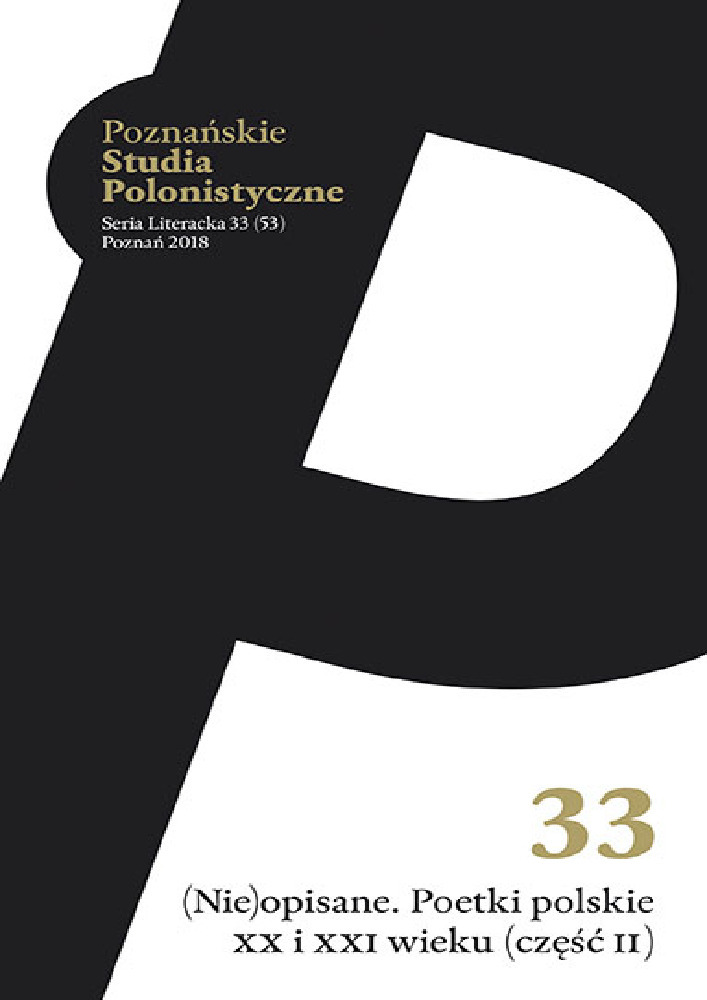Abstract
The bilingual poetry of Irena Klepfisz, a Polish-born Jewish-American poet, seems to constitute a unique case of Holocaust poetry. The poet, an intellectual and activist engaged in lesbian, queer, feminist and gender movements, advocates the reading of Holocaust poetry within the ramifications of gender oriented cultural theories. Her bilingual poetry undermines the hypothesis of the postvernacularity of contemporary Yiddish. The paper substantiates the thesis that the choice of the target language in the translaton of bilingual Holocaust poetry has clear axiological underpinnings.References
Boase-Beier Jean (2015), Translating the Poetry of the Holocaust. Translation, Style and the Reader, Bloomsbury Academic, London [ebook].
Gershon Karen (1994), A Lesser Child. An Autobiography, Peter Owen, London.
Gershon Karen, red. (1966), We came as children. A collective autobiography, Victor Gollancz ltd, London.
Greville Anthony (2012), Lotte Kramer’s collection, „AJR Journal”, t. 12, nr 5, http://www.ajr.org.uk/journalpdf/2012_May.pdf [dostęp: 12 lutego 2017].
Gross Natan, red. (1993), Poeci i Szoa. Obraz Zagłady Żydów w poezji polskiej, Offmax, Sosnowiec.
Horowitz Sara R., Holocaust Literature, w: Jewish Women’s Archive, https://jwa.org/encyclopedia/article/holocaust-literature [dostęp: 5 lutego 2017].
Horowitz Sara R. (1998), Women in Holocaust literature: engendering trauma memory, w: Women in the Holocaust, red. Dalia Ofer, Lenore J. Weitzman, Yale University Press, New Haven–Connecticut, s. 364-377.
Keff Bożena, red. (2012), Tango łez śpiewajcie muzy. Poetyckie dokumenty Holokaustu, ŻIH, Warszawa.
Klepfisz Irena (1990a), A Few Words in the Mother Tongue. Poems Selected and New (1971-1990), The Eight Mountain Press, Portland, Oregon.
Klepfisz Irena (1990b), Dreams of an Insomniac. Jewish Femnist Essays, Speeche san Diatribes, The Eight Mountain Press, Portland, Oregon.
Klepfisz Irena (2016), Yiddish: It’s Complicated, w: Languages of Modern Jewish Cultures. Comparative perspectives, red. Joshua Miller, Anita Norich, University of Michigan Press, Ann Arbor, Michigan, s. 394-406.
Kramer Lotte (1999), Heimweh. Homesick, red., przeł. Beate Hőrr, Brandes & Appsel, Hamburg.
Kubińska Olga (2016), Od „ni takiego, ni owakiego” do postawy „stereoskopowej i stereofonicznej”: pisarze wobec bilingwizmu, „Tekstualia”, nr 3 (46), s. 5-16.
Lawson Peter (2008), Three „Kindertransport” Poets, „Critical Survey”, t. 20, nr 2, Holocaust Poetry, s. 88-102.
Markiewicz Henryk, red. (1997), Żydzi w Polsce. Antologia literacka, Universitas, Kraków.
Markowski Michał (2006), O reprezentacji, w: Kulturowa teoria literatury. Główne pojęcia i problemy, red. Michał Paweł Markowski, Ryszard Nycz, Universitas, Kraków, s. 288-296.
Niger Samuel (1941, 1990), Bilingualism in the history of Jewish Literature, Louis la Med Foundation, Detroit–Michigan.
Ofer Dalia, Weitzman Lenore J., red. (1998), Women in the Holocaust, Yale University Press, New Haven–Connecticut.
Paterson Nancy J., red. (2001), Against Amnesia. Contemporary Women Writers and the Crises of Historical Memory, University of Pennsylvania Press, Philadephia–Pennsylvania.
Pavlenko Aneta (1998), Second Language Learning by Adults: Testimonies of Bilingual Writers, „Applied Linguistics”, t. 9, nr 1, s. 3-20.
Rosenfeld Alvin Hirsch (1980), A Double Dying: Reflections on Holocaust Literature, Indiana University Press, Bloomington-Indiana.
Roth Laurence (1999), Pedagogy and the Mother Tongue: Irena Klepfisz’s „Di rayze aheym/ The journey home”, „Symposium”, t. 52, nr 4, s. 269-278.
Rowland Antony (2005), Holocaust Poetry: Awkward Poetics in the work of Sylvia Plath, Geoffrey Hill, Tony Harrison and Ted Hughes, Edinburgh University Press, Edinburgh.
Schiff Hilda, red. (1995), Holocaust Poetry, Saint Martin’s Press, New York.
Schmid Monika S. (2002), First Language Attrition, Use and Maintenance. The case of German Jews in anglophone countries (Studies in Bilingualism), John Benjamins Company, Amsterdam.
Schreiber Maeera Y. (2007), Singing in a strange land. A Jewish American poetics, Stanford University Press, Stanford–California.
Shandler Jeffrey (2006), Adventures in Yiddishland. Postvernacular in Language and Culture, University of California Press, Berkeley [ebook].
Sherry Simon (2008), Yiddish in America, or styles of self translation, w: Beyong Descriptive Translation Studies: Investigations in Homage to Gideon Toury, red. Anthony Pym, Miriam Schlesinger, Daniel Simeoni, John Benjamins Publishing Company, Amsterdam–Philadelphia, s. 67-78.
Szirtes George (2014), What being bilingual means for my writing and identity, „The Guardian”, 3 maja, https://www.theguardian.com/education/2014/may/03/george-szirtes-bilingual-poetry-translation [dostęp: 8 maja 2018].
Szwarcman-Czarnota Bella (2006), Mocą przepasały swe biodra. Portrety kobiet żydowskich, Fundacja im. Profesora Mojżesza Schorra, Warszawa.
Szwarcman-Czarnota Bella (2010), Dylematy świeckiej tożsamości żydowskiej w dwujęzycznej poezji Ireny Klepfisz, w: Nieme dusze? Kobiety w kulturze jidysz, red. Joanna Lisek, Wydawnictwo Uniwersytetu Wrocławskiego, Wrocław, s. 242-256.
Weiman-Kelman Zohar (2010), Onrirn di cajt – dotykając czasu. O erotyzmie jidysz, przeł. Anna Ostrowska, „Cwiszn”, nr 3, s. 18-23, http://www.cwiszn.pl/files/files/zohar_18-23.pdf [dostęp: 1 lutego 2017].
Weyland Marcel, red. (2007), Echoes. Poems of the Holocaust, przeł. Marcel Weyland, Verand Press, Blackheath.
Żółkiewska Agnieszka, red. (2012), Słowa pośród nocy. Poetyckie dokumenty Holokaustu, przeł. Marek Tuszewicki, Agnieszka Żółkiewska, Michał Koktysz, ŻIH, Warszawa.
License
Authors
Authors of texts accepted for publication in „Poznańskie Studia Polonistyczne. Seria Literacka” are required to complete, sign and return to the editor's office the Agreement for granting a royalty-free license to works with a commitment to grant a CC sub-license.
Under the agreement, the authors of texts published in „Poznańskie Studia Polonistyczne. Seria Literacka” grant the Adam Mickiewicz University in Poznań a non-exclusive, royalty-free license and authorize the use of Attribution-NoDerivatives 4.0 International (CC BY-ND 4.0)Creative Commons sub-license.
The authors retain the right to continue the free disposal of the work.
Users
Interested Internet users are entitled to use works published in „Poznańskie Studia Polonistyczne. Seria Literacka” since 2016, for non-commercial purposes only, under the following conditions:
- attribution - obligation to provide, together with the distributed work, information about the authorship, title, source (link to the original work, DOI) and the license itself.
- no derivatives - the work must be preserved in its original form, without the author's consent it is not possible to distribute the modified work, such as translations, publications, etc.
Copyrights are reserved for all texts published before 2016.
Miscellaneous
Adam Mickiewicz University in Poznań retains the right to magazines as a whole (layout, graphic form, title, cover design, logo etc.).
